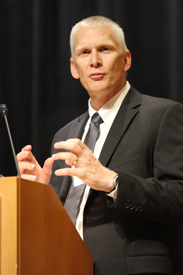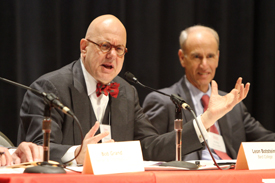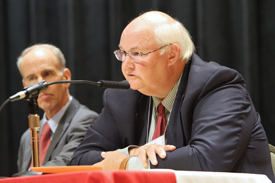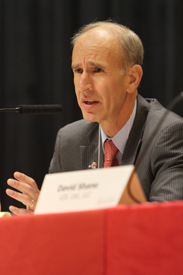Welcoming national leaders in higher education to the conference Celebrating the Value of a Liberal Arts Education, host Charlie Blaich urged all to speak their minds.
 “Don’t be afraid to be provocative,” said Blaich, the director of the Center of Inquiry in the Liberal Arts at Wabash College. Fear was never a factor for panelists speaking on “Ethics and Working in a Diverse World,” as Bard College President Leon Botstein embraced Blaich’s invitation.
“Don’t be afraid to be provocative,” said Blaich, the director of the Center of Inquiry in the Liberal Arts at Wabash College. Fear was never a factor for panelists speaking on “Ethics and Working in a Diverse World,” as Bard College President Leon Botstein embraced Blaich’s invitation.
But if Botstein seemed to disagree with his fellow panelists—Indiana University Dean Bobby Schnabel and Indianapolis attorney and education reformer David Shane—regarding how deeply a liberal arts education shapes a student’s ethics, all three found plenty to recommend the liberal arts as a better way understand and act “in the gray areas where life is lived.”
And the session ended with a haunting ethical question of its own.
Moderator and Indianapolis attorney Bob Grand got things started with an example of how his education has been “the key to my relating to people.
“Too often, people hide behind their phones, or texts, or emails—I think face-to-face conversation is important,” and learning that was part of his liberal arts education.”
But Botstein said many institutions are liberal arts colleges in name only.
“If we’re going to defend the liberal arts—and this is a good time to do it—then let’s actually do the liberal arts,” said the musician, historian, and higher ed icon who has led Bard for 39 years. “Everyone’s love of the liberal arts I’ve heard this morning is really love of alma mater, the love of community, nostalgia…a lot of rhetoric about critical thinking, confrontation.
“The basic principle [of the liberal arts] is that we believe that there is a connection between the intellectual tradition and the conduct of life. But modern history does not make a connection between education and ethics. That connection got blasted out by Auschwitz, Hiroshima, Nagasaki, Hiroshima, and everything that has happened since. Those catastrophes were not engineered by ignorant barbaric people; a little knowledge goes a long way, unfortunately.”
 Botstein described inmates in Bard’s degree-granting programs in six New York state correctional facilities as “the best students we have. They realize their mental faculties are the one thing incarceration could not steal from them.”
Botstein described inmates in Bard’s degree-granting programs in six New York state correctional facilities as “the best students we have. They realize their mental faculties are the one thing incarceration could not steal from them.”
Bard also has overseas programs in Russia, Kyrgyzstan, and the West Bank, and Botstein wondered aloud how people in those cultures, which don’t have a tradition of liberal arts colleges, might define the liberal arts.
“We are trying to allow them to articulate what they think in order to figure out whether what they think they believe is really what they believe.
“There are some fundamental principles that make the liberal arts distinctive: Students have to be able to understand how to evaluate the rules of evidence, to distinguish fact from fiction; they need to understand by reading very closely what a subtext of an argument is, what a point of view is, what a contested and not contested possibility is, to understand counterintuitive reasoning. They need to understand science in a way few do.
“And while we have to make a presumption that there is some connection between education and ethics, I wouldn’t want to defend it too aggressively.”
The Bard president did see the residential experience as a catalyst in a student’s ethical formation and a bridge between classroom and daily living.
“We teach ethical theory in the first year seminar because you want to connect the liberal arts to the conduct of life, whether in the dormitory or at home. One of the ways to do this is to introduce the residential liberal arts community. Liberal arts education is about transactions in small spaces in real time.”
 “A free and ordered space” panelist David Shane called it, borrowing from the title of Bart Giamatti’s book of the same name. He recalled the reaction of Duke University Law School Professor George Christie when Shane answered a question incorrectly in class.
“A free and ordered space” panelist David Shane called it, borrowing from the title of Bart Giamatti’s book of the same name. He recalled the reaction of Duke University Law School Professor George Christie when Shane answered a question incorrectly in class.
“He spun, fired his chalk at me, it exploded, and he said, ‘Shane, when are you going to learn that my job is not to teach you the letter of the law? My job is to help you understand the interstices between the letters of the law. That’s where life is lived.’”
Shane—an attorney and retired CEO of LDI, Ltd, who has worked extensively for education reform and served Indiana Governor Mitch Daniels as Senior Policy Advisor for Education and Employment—suggested that the “free and ordered space” of his undergraduate years taught him how to live that life.
“The liberal arts are all about the interstices, all about the grey areas,” Shane said. “It’s all about getting along when getting along is harder rather than easier; it’s all about thinking vertically in terms of improvement, as opposed to horizontally as in your rights versus my rights; it’s all about common cause and a general understanding of the commonweal as opposed to ‘me.’ It builds a tendency, therefore, to be thoughtful about the other, which is the premise of good ethical engagements.”
In this liberal arts environment, Shane said, “students have the power of freedom, so they understand the consequences of it, they understand the obligations of it, they understand that if it is responsibly exercised in the context of others you can deal with issues much more easily than if you’re on your own. You can build things, build ethical results and increase ethical capacity in yourself and others.”
This way of building, Botstein added, benefits both students and their employers.
“If we do it well, the liberal arts shapes the horizon of dreaming of the individual—what they can imagine and how they structure their ambition. So as an employer, you get someone who is thinking about the future of the business, not only their own success. They have a habit of speculating, daydreaming, inventing—there’s no doubt that this kind of skill goes beyond the text book.”
During the question and answer session, former ProLiteracy Worldwide CEO Robert Wedgeworth asked what happens when this newly hewn ethical capacity meets the workplace and a consumer society that often misrepresents itself. He asked, “How do you train students to see this when they have to go out and be a part of that system?”
“There’s no connection between ethics and capitalism,” Botstein said. “So if you accept that we’re in a capitalist system, the best protection is not in the salesman, but in the buyer. We’re not educating the captains of industry to convince them to be more moral. Educate the intelligent skeptical consumer, and then they’ll stop lying because it’s not as effective.”
Shane believes captains of industry have their own responsibilities that can be shaped by education.
“The employer has an obligation to explain to his employees that there are limits. One of those limits is that the corporation does not want to engage in misleading behavior. A good liberal arts education a creates a capacity to at least have that be part of the equation.”
 Reflecting upon how his liberal arts education paved the way for his ethical views and his work in a diverse world, panelist Bobby Schnabel said his gut reaction was “not very much.”
Reflecting upon how his liberal arts education paved the way for his ethical views and his work in a diverse world, panelist Bobby Schnabel said his gut reaction was “not very much.”
“Hopefully, the foundation for ethics comes earlier,” said Schnabel, Dean of the School of Informatics at Indiana University. He has been honored by the White House for his work founding the National Center for Women & Information Technology, a national non-profit organization aimed at increasing the participation of women and girls in information technology education and careers.
The son of first-generation German immigrants, he grew up in a very diverse setting—in nationality, religion, and race—in Queens, NY.
“Then I go to Dartmouth in the early 1960s, which was about as non-diverse as it gets. The only thing I hadn’t seen before were rich people who went to prep school.
“But the contributions to ethics and diversity I received there were about the curriculum. It was about the things that I got to study that I would not have gotten to study if I was doing a technical type education.”
Schnabel recalled a seminar that introduced him to the works of African-American writers James Baldwin and Richard Wright, a music appreciation course that imbued him with a lifetime love of opera, and five semesters of German that enabled him to “experience the culture more from the inside than the outside.”
Schnabel focused most of his remarks on the panel’s second question—What would you add or modify to liberal arts education today?—and his own area of expertise, building bridges between liberal arts education and professional education. As founding director of the University of Colorado’s Alliance for Technology, Learning, and Society (ATLAS), a campus-wide information technology institute, his signature program was a digital media program that attracted students from the liberal arts.
“Some students wanted to augment what they were already doing, some were using this as a transition to doing something else, and at the other end of the spectrum were students who were doing it entirely out of intellectual curiosity—they simply wanted to learn.”
At IU, Schnabel works with students majoring in informatics.
“It is essentially an applied technology major combined with something else of the student’s choosing, in many cases one of a vast array of liberal arts topics, and it is the third largest major at IU. There is great demand for employees for those who can bridge some technology with the ability to apply it to other fields.”
A similar program now extends beyond the IU campus.
“Liberal Arts Pathways is a way to enable liberal arts students to combine their education with some bridge toward the professions, such as business and technology.
“Beyond that we’re looking at 4-plus-1 programs that will allow students to complete a liberal arts degree, either on our own campus or other campuses, and then efficiently move into educational experiences in a profession,” Schnabel concluded. “Career advising is a big piece of this. We see many of our interns in these programs get job offers.”
Schnabel added that many students seem to be turning away from the “how much money can I earn mentality” to more of a “social-good” consciousness.
“One of the most successful things we’ve done has put liberal arts students to work with non-profits while they’re going through school. I think we may be seeing a generational shift that may be working more in our favor, and there may be ways to enhance that and underscore that as educators.”
As encouraging as that generational shift may be, Shane says the nation faces a vexing question, as higher education becomes “the dividing line between a life happily and productively lived and merely earning a living wage.
“What do we do about the fact that Indiana is represented in the hundreds of thousands of adults who are not educated to live and work in today’s society? It’s not just a practical question; it’s an ethical question. What is our moral response?
“If you have spent some time face to face with professors and fellow students struggling with those sorts of questions in your undergraduate years at a liberal arts institution, you’re much more able to deal with it as a responsible and free citizen as an adult.”